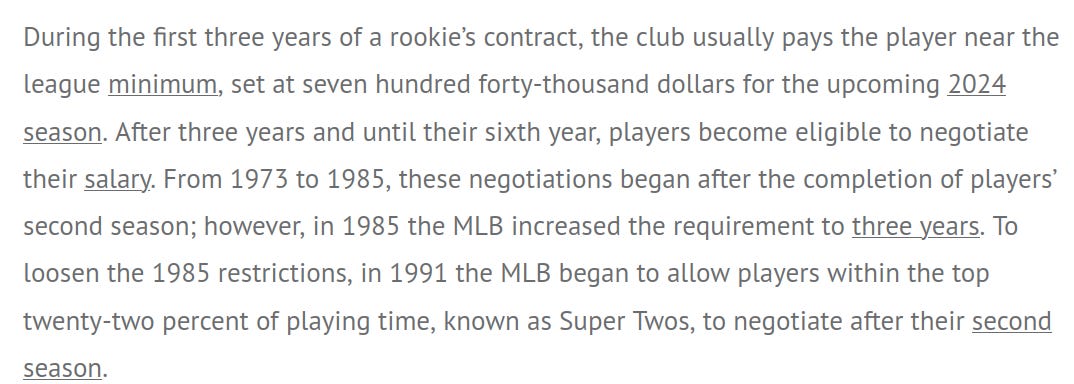Arbitration in OOTP
It’s time for another action-packed post about the nitty gritty details of how OOTP’s financial system works!
All kidding aside, it’s pretty important to understand this stuff. Unfortunately, the various manuals the company has produced over the years is not the easiest thing in the world to read.
As I noted before, when a player’s contract expires in OOTP, one of three things happens. The player becomes a free agent, or, if he’s got less than the number of years he needs to enter arbitration, then he’ll automatically receive a contract at the league minimum.
The third option is arbitration. Let’s take a look at that.
First off, we need to understand how this works in real life. This article from The Arbitration Brief is a pretty good exposition on the subject, which I’ll try to summarize.
It all goes back to the famous Peter Seitz decision in December 1975, which destroyed the old reserve clause. Seitz ruled that Andy Messersmith and Dave McNally were no longer under contract with their teams and could be considered free agents. After Major League Baseball exhausted all of its appeals, the league and the Player’s Association agreed that players would enter free agency after 6 years of service.
Now — if you’re keeping score, you’re probably wondering why we care about 3 years of service if free agency doesn’t start until 6 years. This is because players are allowed to negotiate their salaries with teams after 3 years. In fact, this was actually originally a 2 year period:
There are a lot of problems with this system, about which we’ll go into detail in a later post. There’s an obvious incentive here for players to prevent their best players from entering into arbitration for as long as possible, which helps explain some of the more bizarre roster movements we’ve seen in recent years.
The arbitration system itself is refered to as pendulum arbitration, the details of which you can read up on for yourself if you are interested.
Now, the first thing you need to know about how this works in OOTP is that you can change the years to whatever you want. You can allow players to enter free agency after a single year, for example, or you can prevent free agency until you’ve reached 20 years of service. This is determined by “minimum service years for free agency” and “service years required for arbitration” in League Settings > Finances:
The idea behind arbitration is to reward good players for their performance before they are eligible for free agency. And, since you’re GM of your club, you absolutely have an incentive to try to make that arbitration amount as low as possible.
You can negotiate with players who are eligible for arbitration during the “Arbitration Offer Period.” In OOTP, this is from the day after the final playoff game until Salary Arbitration Hearings take place. Those typically take place in November, which means you’ve probably got a couple of weeks in-game to get this taken care of.
If you want to take a player to arbitration, look for a screen called “Salary Arbitration.” This is located in the League Menu, and should also show up on your Manager Portal. This will give you a list of players who are available for arbitration.
To initiate the arbitration process, offer a one year contract to the players you want to take to arbitration. Note that they will automatically become free agents if you don’t make an offer.
The way the process works is similar to that “pendulum” model I listed above. Basically - you submit one number, the player submits another, and the arbitrator chooses between the two.
Now, the interesting part here is that you can negotiate contracts with players during this process. If you can get them to agree to a new contract, they will no longer be eligible for salary arbitration.
The other thing to note is that some players will be eligible for arbitration early if the “Super 2” rule is turned on. “Top 17%” next to “Super 2” means that players in the top 17% of service time with at least two years of service are eligible for salary arbitration.
Clear as mud, right? Remember that you can always turn this off if you want. It’s important to understand, however, if you want to imitate the way contracts actually work in Major League Baseball.






It's worth noting that if you allow a player's contact to be determined by arbitration, it will have a small negative impact on their morale — and possibly their relationship with you (though I'm less certain about this one). It's better to agree to terms on a one-year deal before the arb hearings.
Last I played OOTP you could generally lock good players in to long term contracts that via arbitration. It’s one of the reasons I got out of OOTP. I really only played in online leagues against human managers and we had to come up with rules outside of the game to prevent such extensions. It became a pain to keep up with the requirements outside of the league. Has the game done a better job at allowing realistic extensions? I probably haven’t played in close to 5 years.